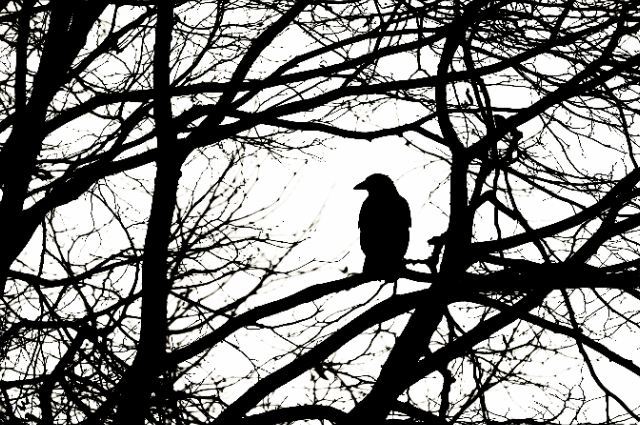
Photo by Mark Timberlake on Unsplash
Edgar Allan Poe's poem "The Raven" is a hauntingly beautiful piece of literature that has captivated readers for generations. Beyond its melodic rhythm and chilling atmosphere, the poem is filled with metaphors and hidden meanings that add depth and complexity to its interpretation.
The Raven as a Symbol
One of the most prominent metaphors in "The Raven" is the raven itself. The raven is often seen as a symbol of death, darkness, and the supernatural. It represents the narrator's grief and his descent into madness. The raven's repetition of the word "nevermore" echoes the narrator's despair and his realization that he will never be reunited with his lost love, Lenore.
Here are some key aspects of the significance of "Nevermore" in "The Raven":
Loss and Finality:
"Nevermore" represents the narrator's realization that he will never be reunited with his lost love, Lenore. The repetition of this word emphasizes the finality of death and the impossibility of finding solace or closure.
The Raven's Omens:
The raven's repeated use of "Nevermore" adds to its mystique as a supernatural creature. Its response becomes a prophetic and ominous declaration, intensifying the narrator's despair and deepening the sense of mystery and foreboding within the poem.
The Power of Grief:
Through the repetition of "Nevermore," Poe captures the all-consuming power of grief. The narrator desperately seeks answers from the raven, hoping for a glimmer of hope or a way to alleviate his suffering. However, the raven's consistent response serves as a reminder of the inescapable nature of loss and the futility of seeking relief from his grief.
Symbol of Memory:
"Nevermore" also represents the narrator's inability to forget or move on from his loss. The word echoes in his mind, becoming a haunting refrain that echoes his sorrow and prevents him from finding peace.
The significance of "Nevermore" in "The Raven" lies in its representation of loss, despair, and the inescapable grip of grief. It adds to the poem's dark and melancholic atmosphere, leaving a lasting impact on readers.
The Symbolism of the Night and the Chamber Door
Throughout the poem, Poe creates a haunting atmosphere by setting the scene at midnight, a time associated with darkness and mystery. The chamber door mentioned in the poem represents the boundary between the conscious and unconscious mind, symbolizing the narrator's struggle to escape his torment and find solace.
The Theme of Loss and Longing
"The Raven" explores themes of loss, longing, and the inability to move on from past sorrow. The narrator's obsession with the raven and his repeated questioning of the bird about Lenore reflect the depths of his grief and his desperate desire for closure. The poem delves into the universal human experience of grappling with loss and the haunting memories that linger.
The Allure of the Supernatural
Poe often incorporated elements of the supernatural in his works, and "The Raven" is no exception. The presence of the raven, a mystical and enigmatic creature, adds an air of the supernatural to the poem. It blurs the line between reality and the fantastical, adding to the sense of mystery and intrigue that permeates the narrative.
The Descent into Madness
As the poem progresses, the narrator's mental state deteriorates, and he becomes increasingly consumed by his obsession with the raven. The raven's constant presence and its ominous responses push the narrator further into madness. This descent into madness is a powerful metaphor for the fragile boundaries of the human mind and the overwhelming power of grief.
The Timeless Appeal of "The Raven"
"The Raven" continues to resonate with readers because of its rich symbolism and hidden meanings. The metaphors and layers of interpretation invite readers to explore the depths of human emotion, the mysteries of the subconscious, and the fragility of the human psyche.
To fully appreciate the richness of "The Raven," it is essential to delve into its metaphors and hidden meanings. Analyzing the poem's symbolism allows us to unlock the profound messages embedded within Poe's haunting verses.
Here is the full poem;
Once upon a midnight dreary, while I pondered, weak and weary,
Over many a quaint and curious volume of forgotten lore -
While I nodded, nearly napping, suddenly there came a tapping,
As of some one gently rapping, rapping at my chamber door.
“’Tis some visitor,” I muttered, “tapping at my chamber door -
Only this and nothing more.”
Ah, distinctly I remember it was in the bleak December;
And each separate dying ember wrought its ghost upon the floor.
Eagerly I wished the morrow; vainly I had sought to borrow
From my books surcease of sorrow - sorrow for the lost Lenore -
For the rare and radiant maiden whom the angels name Lenore -
Nameless here for evermore.
